IFLA Presidential Newsletter May 2012
07 May 2012
 Dear IFLA Colleagues,
Dear IFLA Colleagues,
We have now passed the mid-year of the IFLA cycle, the time when many IFLA Sections hold the mid-term meetings of their Standing Committees. I therefore bring you news from the meetings of the three IFLA Regional Sections where cooperation with the local hosts has helped to bring local librarians, students and library associations into contact with their IFLA colleagues from further afield. April has also been the month for a couple of international events that many libraries have been celebrating: World Book Day and the launch of the World Book Capital. These events have given me the opportunity to highlight the role that libraries play in supporting literacy, and a new campaign, Beyond Access, is highlighting the broader role that libraries can and should play in development.
I also want to share some tremendous news from our Building Strong Library Associations programme, and a round-up of news from the IFLA Governing Board following its meeting at the beginning of April. We are all going to be busy for the next few months making the final plans and preparations for our IFLA committee meetings, satellite conferences, congress programmes, presentations, posters, and trips to Helsinki, and there's still much more going on besides! I hope you enjoy reading.
Indigenous Knowledges: the 2012 IFLA Presidential Meeting
From the 12th to the 14th of April, we welcomed some of the IFLA community to my hometown of Vancouver to participate in my first IFLA Presidential Meeting which took the theme "Indigenous Knowledges: Local priorities, Global contexts". The audience, as well as the programme, showed the wonderful diversity that IFLA encompasses and we spent a stimulating few days together learning more about Indigenous and traditional knowledge, its creation, organization and access, to better understand the local and global issues under discussion in various parts of the world.
Through the sharing of knowledge and experiences, we hope to advance the understanding of traditional knowledge at both the local and international levels. The results are being used within IFLA to inform the development of legal instruments, policies, and practices related to the organization of Indigenous and traditional knowledge around the world.
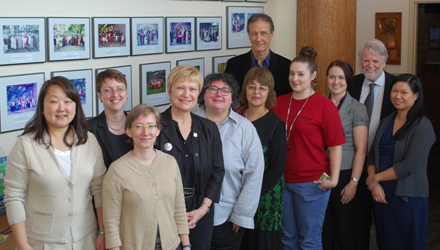
I hope that all those interested in these topics, and others for whom these topics are new, will enjoy watching the webcast of the presentations, which is available on the event website.
I would also like to share with you the report from one of the students at my university who attended as a volunteer during the event:
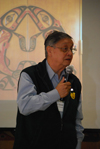 IFLA's 2012 Presidential Meeting on Indigenous Knowledges brought together a diverse group of people from around the world for two days of stimulating, challenging, and thoughtful discussion. The meeting opened with a welcome from Musqueam elder Larry Grant and an introduction to the Longhouse building and the knowledge embedded in its design.
IFLA's 2012 Presidential Meeting on Indigenous Knowledges brought together a diverse group of people from around the world for two days of stimulating, challenging, and thoughtful discussion. The meeting opened with a welcome from Musqueam elder Larry Grant and an introduction to the Longhouse building and the knowledge embedded in its design.
On the first day we heard about local examples from all over the world with an emphasis on the importance of practice: on applying theory in the field, creating tangible, meaningful connections with both indigenous and non-indigenous patrons through openness, thoughtful and respectful inquiry, and willingness to reach out and engage outside of the library.
On the second day the focus shifted to broad perspectives of some of the international organizations involved in developing discourse, recommendations and policies around indigenous information. Grand Chief Ed John set the tone for the day by emphasizing the essential place of information organization and access expertise within indigenous communities. Following this, a fascinating array of examples of the process of collection development involving indigenous materials was presented. Central to each of these efforts has been the transfer of power over indigenous materials from institutions to communities of origin. Throughout the meeting speakers acknowledged some of the more painful and unfortunate elements of the history between indigenous knowledge and European systems, but they also looked hopefully toward the future, and provided examples of newly synthesized approaches to information that are already being used effectively by new generations of indigenous and non-indigenous people alike.
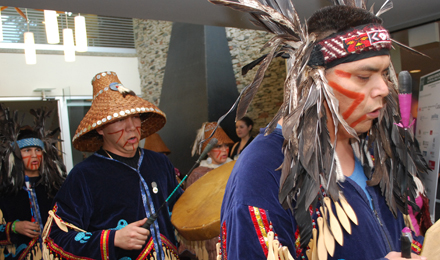
Musqueam dancers closing the Presidential Meeting
Many present expressed the hope that everyone involved would now return to their work with a renewed commitment to incorporating these issues, ideas and tools into their professional practice. The weekend ended as it began, with Musqueam voices wishing all in attendance a safe journey home.
Prepared by Samantha Mills, MLIS student, the iSchool @ UBC
News from Asia and Oceania
Library services for multicultural communities have also been on the agenda on the other side of the world. The Asia and Oceania Section's mid-term meeting took place in Auckland, New Zealand, in February and was attended by fifteen members. It was combined with a regional seminar on the theme "Library and information services for multicultural populations in Oceania and Asia". I thank Governing Board member Christine Mackenzie for representing me.
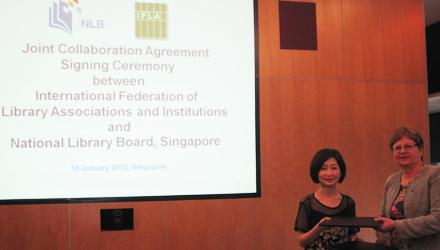
On 18 January 2012, the National Library Board of Singapore (NLB) was re-appointed as host of the Asia and Oceania Regional Office for the next five years. The Regional Office plays an essential role for IFLA in supporting and promoting activities in the region. IFLA is very pleased to be able to continue our collaboration with such a leading library organization as the NLB in order to increase our participation and impact in the region.
News from Africa
The Africa Section's mid-term meeting, held in February, in Bulawayo, Zimbabwe, also attracted fifteen section members. This meeting was combined with an opportunity to speak to the wider library community in the region. They invited a number of observers from ZIMLA – the Zimbabwe Library Association, ZULC Zimbabwe – the University Libraries Consortium, and the Department of Library and Information Sciences of NUST, the National University of Science and Technology which hosted the meeting. LIS students from NUST and from the Polytechnic were invited to presentations about IFLA and they asked a lot of questions about IFLA's relationship with students, and its activities in and around Zimbabwe. This engagement with the wider community was much appreciated by all the participants. I thank Governing Board member Buhle Mbambo-Thata for representing me.
News from Latin America and the Caribbean
The Latin America and the Caribbean (IFLA/LAC) Section's Standing Committee held its mid- term meeting in Medellin, Colombia, in March. The Committee contributed to a conference on the theme "Libraries on the Political Agenda" that preceded the meeting. Both events were organized and sponsored by IFLA/LAC, the Municipality of Medellin, the Medellin Public Libraries System and Comfenalco Antioquia. The conference was a space for discussing and understanding the importance of public libraries' role in the political agenda of governments, as well as in private and public sectors. Thank you to Felipe Martinez and Gerald Leitner, IFLA Governing Board members, who represented IFLA and delivered keynote speeches addressing the main subject of the conference. Officers of IFLA/LAC, Sigrid Karin Weiss Dutra and Jaime Rios, participated in a round table on LIS students' training also on this theme. Around three hundred librarians, LIS professors, students and other stakeholders attended the conference whose main purpose was to awaken the role of public libraries on the agenda.
Beyond Access: Libraries powering development
IFLA is involved in a new initiative focusing on public libraries and development by being part of the Beyond Access Campaign. The campaign's starting point is that development efforts deliver greater results when they are anchored in sustainable local institutions. These institutions are public libraries, over 230,000 of which – 73% of the world's total – are located in developing and transitioning countries.
The Beyond Access Campaign is seeking to draw attention to this fact and encourage policy makers to better utilise public libraries in their development policies. To do this, Beyond Access demonstrates how libraries can help promote such development: libraries and librarians have a history as trusted, community-based sources for addressing people's information needs. Public and community libraries are sustainable local institutions that can stimulate grassroots development. Libraries around the world can, and have become, powerful partners to help deliver services that enable communities to achieve the United Nations Millennium Development Goals. They offer a proven, existing and sustainable venue that deliver results.
The campaign is gaining momentum and is working towards a conference that will take place between the 2nd and 4th of October this year in Washington, DC. You can follow Beyond Access on the website mentioned above and also on Twitter: @Beyond_Access.
23 April: Books on the world stage
UNESCO World Book Day
Many of us celebrated UNESCO World Book and Copyright Day on 23 April. I recorded this short speech to highlight the crucial role that libraries play in linking people with books and the wisdom they contain, and to remember all people who cannot read, be it through illiteracy, censorship or language barriers.
UNESCO's own celebrations this year focused on translation and this gives me the perfect opportunity to mention to you one of IFLA's own translation projects. During the IFLA Governing Board's meeting at the beginning of April, I was very pleased to be able to switch on some welcome pages on the main IFLA website in all seven official IFLA languages. You'll find these at the very top of the IFLA home page, and soon they will start to grow into gateways to more and more of the IFLA website, first in French and Spanish this year, before the others develop in 2013. The Governing Board's Working Group on Multilingualism and volunteers from the Regional Offices, as well as staff at HQ, have been working hard on this for some time and I hope you will appreciate the results.
UNESCO World Book Capital 2012
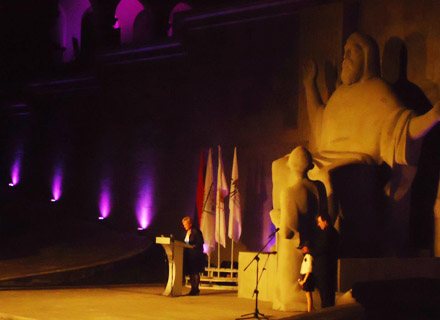
23 April was also the launch of the new World Book Capital 2012 Yerevan in Armenia. IFLA is on the jury that selects the World Book Capital, and I was therefore invited to attend and give a speech during the handover ceremony which took place the night before, on 22 April. The ceremony was very impressive and attended by the Armenian President, Prime Minister and the Supreme Patriarch. It featured an open air concert by Andrea Bocelli and ended at midnight with fireworks.
The main message during the ceremony was how books and language contribute to preserving and promoting the Armenian culture and identity. They were also celebrating 500 years since the printing (in Venice) of the first Book in Armenian. I am confident that Yerevan's programme of events over the coming year will also encourage not only books and reading, but the use of libraries. We know that libraries are more than a place to take out books or provide access to the Internet. Libraries can become community centres that welcome everyone regardless of race, age, culture or religion. They can be places to encourage discussion, and in many cases help preserve historical and cultural traditions, encourage partnerships among community organizations and enhance community spirit.
Enhancing the Culture of Reading and Books
On 3-4 May the Secretary General and the Director of Policy and Advocacy were in Nairobi, Kenya for the conference, "Enhancing the Culture of Reading and Books in the Digital Age: Copyright as a means to foster creativity and access". This event follows on from similar events held in Frankfurt (2008) and Tokyo (2010) and is organised jointly with the World Intellectual Property Organization (WIPO), the International Federation of Reproduction Rights Organisations (IFRRO), and the International Publishers Association (IPA).
Building Strong Library Associations Programme
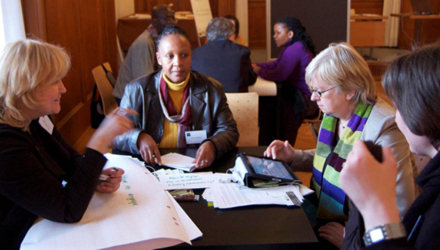
The Building Strong Library Associations (BSLA) programme has produced some wonderful successes for the participating country associations, including increases in membership, success in obtaining government grants, reading campaigns, and advocacy for IFLA's work on Limitations and Exceptions for Copyright. Representatives from the country projects in Botswana, Cameroon, Lebanon, Lithuania, Nepal, Peru and Ukraine, met in Berlin in February to share these success stories and the challenges that had been faced.
Botswana Library Association has recorded a 100% increase in membership and largest attendance ever at their last national conference. They have received government grants, and are working more closely with the Minister for Education to support school libraries.
Lithuania Librarians' Association carried out a letter writing and literacy campaign in collaboration with the President, which has resulted in the purchase of 17,000 new books for libraries and a relationship with the association as a trusted partner.
Ukraine Library Association reported on improved, regular communication with members and new services, as well as a 30% increase in membership.
ABADCAM Cameroon shared how learning from their first workshop in 2011 gave a librarian in Buea the skills to present a plan to save a school library from closure. The association successfully advocated to the Ministry for Culture for 50 new librarians to be trained, and these new librarians are now employed in public libraries across the country.
Lebanese Library Association has worked to identify contacts and focused on building relationships in government after reorganizing the structure of the association.
CBP Peru has organised rallies to campaign for public library funding, participated in meetings with the national copyright office to advocate for Limitations and Exceptions, and strengthened networks in regional areas beyond Lima.
In another aspect of the programme, the "train-the-trainers" module, which was delivered last year to a number of Arabic speaking librarians at IFLA headquarters, bore fruit and produced an IFLA first: a workshop delivered by videoconference. The workshop was delivered to ten librarians in Saudi Arabia from the Bibliotheca Alexandrina in Egypt.
News from the Governing Board
The IFLA Governing Board, its sub-committees and working groups all met at the beginning of April for three days of hard work at IFLA Headquarters in The Hague. There are a number of very interesting activities going on and I would like to particularly mention two of them which involve IFLA's engagement in times of crisis and in the lending of digital materials.
First, we have seen many examples in recent years of cultural heritage tragically destroyed by either natural disaster or armed conflict. The Governing Board has endorsed new IFLA Principles of Engagement which set out IFLA's role in library-related activities of disaster risk-reduction and in times of conflict, crisis or national disaster. These have been developed following IFLA's involvement in reconstruction after the Haiti earthquake of 2010, and in recognition of a number of international treaties and agreements to which IFLA is a party. The implementation of these principles will be managed by an advisory group which will be endorsed in Helsinki in August.
Second, an issue which touches most of us in our profession: the lending of e-books. The Governing Board endorsed a paper which; describes the current situation and the problems related to the lending of e-books by libraries, as well as proposes a strategy for IFLA to investigate and attempt to solve some of these problems. The paper will be shared with the IFLA community to raise awareness of the issue and to gather advice and ideas.
Also during its meeting the Governing Board endorsed the Manifesto for Libraries Serving Persons with a Print Disability. The Manifesto will now go into the procedure for UNESCO endorsement in 2013.
IFLA is currently finalizing the IFLA Code of Ethics for Librarians, endorsement of which is expected at the next Governing Board meeting in August.
Additionally in the pipeline is a set of Guidelines on Privacy and the Use of Social Media, addressing issues to be considered in the use of social media in, and by, libraries. The Guidelines are expected to be ready for endorsement at the Governing Board meeting in December this year.
New Division Chair
 I would like to welcome Russell Lynch who, as recently appointed Chair of Division II, will serve on the IFLA Governing Board. He was nominated for the position following the resignation of the previous Division Leader and I want to thank him for volunteering for the role. Division II covers "Library Collections" and contains nine Sections, one Special Interest Group, and the Core Activity on Preservation and Conservation. Russell's details are found on the Governing Board's web page.
I would like to welcome Russell Lynch who, as recently appointed Chair of Division II, will serve on the IFLA Governing Board. He was nominated for the position following the resignation of the previous Division Leader and I want to thank him for volunteering for the role. Division II covers "Library Collections" and contains nine Sections, one Special Interest Group, and the Core Activity on Preservation and Conservation. Russell's details are found on the Governing Board's web page.
New Special Interest Group
We should also say a welcome to a new Special Interest Group that was approved by the Governing Board in April – RELINDIAL: Religious Libraries in Dialogue (Interreligious Dialogue) which already has large and multi-faith involvement from across the world.
All the SIGs that have been approved this year will hold meetings during the World Library and Information Congress in Helsinki, so I encourage you to go along and get involved if you are interested.
Awards
Congratulations to Governing Board member Christine McKenzie, CEO of Yarra Plenty Regional Library, on winning the Robert D. Williamson Award. The biennial award is presented to an individual or organisation who or which, has made or is currently making an outstanding contribution to the development of information technology usage in Australian libraries and is positively and significantly influencing development in information technology usage within libraries. Christine was presented with her award at the VALA2012 conference and the citation for the award can be read online.
Another Governing Board colleague, Professor Anna Maria Tammaro, University of Parma, has been awarded "BOBCAT of The Year 2012" for her dedicated work in the field of Information Science and as a supporter of students at BOBCATSSS conferences. Professor Tammaro and her students from the University of Parma co-organized BOBCATSSS2010 in Parma with students from Manchester Metropolitan University, UK.
IFLA/OCLC Fellows and a farewell to Jay Jordan
Finally, a few words about one of IFLA's gold partners, OCLC. In April I joined OCLC staff and guests at the OCLC Headquarters in Dublin, Ohio, United States, for their Global Council meeting and a tribute and farewell event for Jay Jordan, who will retire as OCLC's CEO in June this year. For many years now, IFLA has collaborated closely with OCLC, and with Jay himself. One of the highlights has been the Jay Jordan IFLA/OCLC Early Career Development Fellowship Program. Every year since 2001, the Program has taken five library and information science professionals who are in the early stages of career development and from countries with developing economies, on an intensive four-week study programme based at the OCLC Headquarters.
Following my own visit to OCLC Headquarters, Jennefer Nicholson, IFLA Secretary General, travelled to Dublin, Ohio to meet the 2012 IFLA/OCLC Fellows and to share with them the IFLA experience.
 I have a busy few months coming up with opportunities to represent IFLA on all continents except one. Then we have our Congress coming up in August. Make sure you take advantage of the Early Registration reduced fees before 15 May and don't forget to book your hotel!
I have a busy few months coming up with opportunities to represent IFLA on all continents except one. Then we have our Congress coming up in August. Make sure you take advantage of the Early Registration reduced fees before 15 May and don't forget to book your hotel!
I look forward to seeing you at WLIC 2012 in Helsinki in August!
With best wishes,
Ingrid Parent
IFLA President 2011-2013
Back to the top of this page ↑
|
The Letter of the President is distributed quarterly and provides an overview of some of the current activities of the IFLA President, President-Elect, the Governing Board and IFLA Headquarters staff. It is sent to IFLA-L and other mailing lists organised by IFLA. The newsletter is sent in plain-text and so should cause no reception problems. |